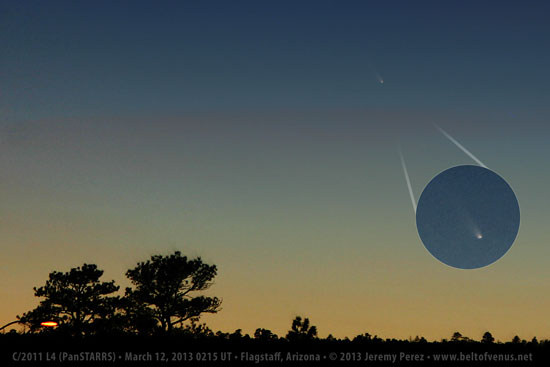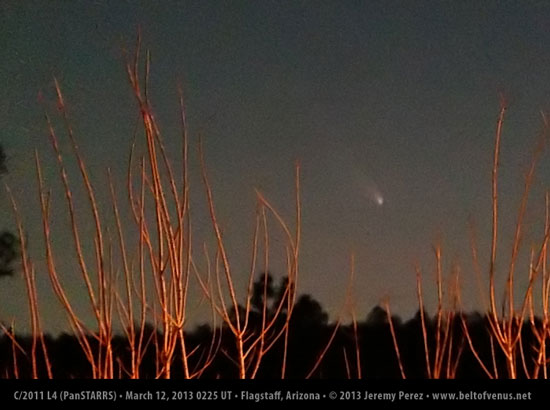The comet was looking better tonight and I was able to view it naked eye as a soft ‘star’ in the twilight. Besides binoculars, I also brought the 8-inch Dob to a school parking lot on McMillan Mesa. The view was most pleasing through binoculars, but some of the delicate structure was more apparent through the scope. I tried to capture the essentials in the sketch above. It’s always awesome watching a comet sink behind the treeline.
I shot and stacked a few photos with my Canon 300D, but since my lens only zooms to 105 mm, the comet was pretty shrimpy in the images. I snagged a few more photos through the binoculars and telecope with the iPhone camera. That gave larger scale, but the images are pretty noisy.
| Subject | C/2011 L4 (PanSTARRS) |
| Classification | Comet |
| Position (J2000) | Pisces: [RA: 0 28.211 / Dec: -0° 1.507′ ]* |
| Magnitude | Not estimated |
| Date/Time | MARCH 11, 2013 – 7:00-7:25 PM MST (MARCH 12, 2013 – 0200-0225 UT) |
| Observing Loc. | Flagstaff, AZ – McMillan Mesa |
| Instrument | 15 x 70 Oberwerk Binoculars Orion SkyQuest XT8 (8″ f/5.9 Newtonian) |
| Conditions | Clear, twilight, some thin cirrus |
| Seeing | Not estimated |
| Transparency | Nautical Twilight |
| *References | Starry Night Pro |



That’s fantastic, Jeremy! You really set the bar for the rest of us.
Wow, thanks Erika! At this point, I think the real bar for everyone has been the elusive cloud-free/haze-free horizon. (I’ve counted myself really fortunate the last couple nights.) I hope you get it and the moon tonight! I can’t wait to see the results.
Jeremy